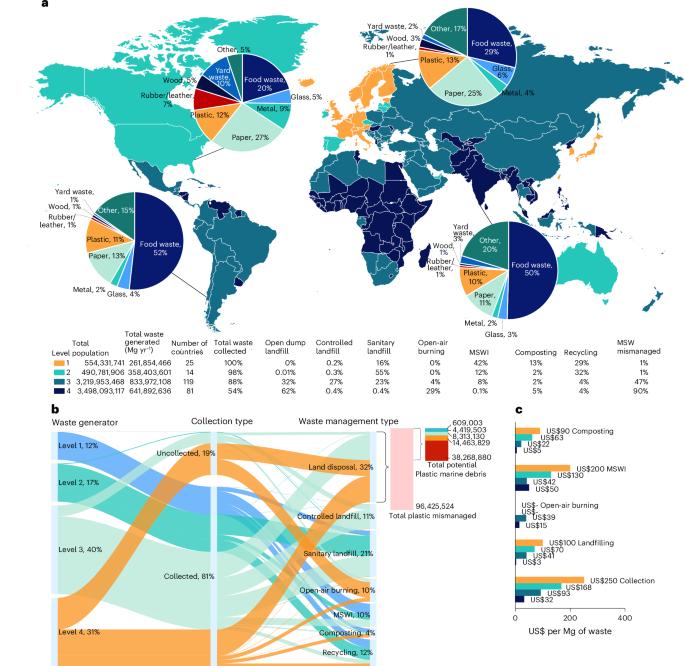改善发展中国家的废物系统,以应对国际环境影响
IF 27.1
1区 环境科学与生态学
Q1 ENVIRONMENTAL SCIENCES
引用次数: 0
摘要
一个国家用于管理固体废物的基础设施不仅影响其人口和环境,还在应对温室气体排放和海洋塑料等全球挑战方面发挥作用。有几种方法试图解决这个问题,但它们的采用取决于可用的资源。当全球南方国家在垃圾收集和严重依赖露天倾倒方面苦苦挣扎时,全球北方国家投资于更先进的技术,将废物从处置转向回收。为了解决跨境废物问题,需要更深入地了解不同战略的成本效益关系。在这里,我们表明,投资推进全球南方的废物基础设施,比全球北方的进一步升级,在温室气体排放和海洋塑料方面取得了更高的缓解效果。基本收集是减少海洋塑料的必要步骤,从露天倾倒和焚烧过渡到有控制的垃圾填埋场,比将现有系统升级到先进技术,更能减少甲烷和黑碳的排放。我们的研究结果表明,在那些投资最少的地区,有针对性的基础设施支出是如何更有效地利用全球资源来缓解气候变化和减少海洋塑料的。固体废物可以影响公共卫生、气候变化和海洋污染,但许多国家缺乏管理固体废物的基本基础设施。现在的一项研究表明,在低收入国家投资于简单的废物处理系统比在富裕国家升级高科技系统带来更大的协同效益。本文章由计算机程序翻译,如有差异,请以英文原文为准。

Improving waste systems in the global south to tackle international environmental impacts
The infrastructure available to a nation for the management of its solid waste not only affects its population and environment, it plays a role in addressing global challenges of greenhouse gas emissions and ocean plastics. Several approaches attempt to address this purpose, but their adoption is dependent on available resources. While nations in the global south struggle with waste collection and rely heavily on open dumping, those in the global north invest in more advanced technologies to divert materials from disposal to recovery. To address cross-border waste concerns, a more in-depth understanding of the cost–benefit relationship of different strategies is required. Here we show that investment in advancing the waste infrastructure of the global south achieves a higher mitigation of greenhouse gas emissions and marine plastics than further upgrades in the global north. Basic collection is the essential step to reducing marine plastics, and a transition from open dumps and burning to controlled landfills does more to reduce methane and black carbon emissions than upgrading existing systems to advanced technologies. Our results demonstrate how targeted expenditures towards basic infrastructure components in those areas with the least investment are a more efficient use of global resources for mitigating climate change and reducing marine plastics. Solid waste can impact public health, climate change and ocean pollution, yet many countries lack basic infrastructure to manage it. A study now shows that investing in simple waste systems in lower-income countries delivers greater co-benefits than upgrading high-tech systems in wealthier ones.
求助全文
通过发布文献求助,成功后即可免费获取论文全文。
去求助
来源期刊

Nature Sustainability
Energy-Renewable Energy, Sustainability and the Environment
CiteScore
41.90
自引率
1.10%
发文量
159
期刊介绍:
Nature Sustainability aims to facilitate cross-disciplinary dialogues and bring together research fields that contribute to understanding how we organize our lives in a finite world and the impacts of our actions.
Nature Sustainability will not only publish fundamental research but also significant investigations into policies and solutions for ensuring human well-being now and in the future.Its ultimate goal is to address the greatest challenges of our time.
 求助内容:
求助内容: 应助结果提醒方式:
应助结果提醒方式:


